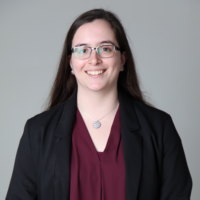
VR is Bad for You?
As part of an ongoing monograph project about video games in Chinese popular television, I shared work in progress at this year’s Society for Cinema and Media Studies (SCMS) annual conference, which was held in Chicago, IL from 3-6 April 2025. I’ve been using conference papers to force me to chip away at the project and get feedback as I go. For this presentation, on a panel sponsored by the Television Studies SIG, I worked through some of the common arguments about VR gaming as presented in thriller, horror, and science fiction dramas. These tend to argue that VR gaming is damaging, and to be avoided. They each have narratives centred around immersive VR games. They also variously present or engage with discourses around an uncanny horror of immersive tech, mediation of the self in virtual spaces as problematic or dishonest, and more often than not the game devs are overseas corporations preying on good honest Chinese citizens.
It’s a contrast to how Chinese TV represents other kinds of gaming: for example, the pillaging of fantasy RPGs for wuxia/xianxia dramas (thereby affirming that kind of interactive fiction as a worthy site for established genre tropes, but also the idea that online gaming can be good for you. In esports dramas, players are shown learning how to work as a team, to value each other’s achievements and strive for excellence to help the team achieve success, to understand the strengths of each member, to be humble in victory and gracious in defeat. Also, to learn to relate to other young adults outside of a school or neighbourhood. Many of the online gaming dramas are also produced by Tencent, arguably the world’s largest games company, where the interest is clear: romcoms and shows about friendship in which gaming is good (or at least benign) feels like an effort to affirm a particular conversation in the Chinese context where online games are often decried as “digital opium”.
For the presentation I touched on:
- Spy Game (Dragon TV/iQIYI, 2023), is about players in a game about spies called Spy Game. The game itself looks quite fun – a sino-cyberpunk setting, where CGI neon is overlaid on familiar standing sets used repeatedly in Chinese dramas that are set in the 1920s and 1930s. In it, offline missions are offered to players who have attained a particular level. The protagonists rapidly find themselves under the scrutiny of the counter-espionage state authorities in China, because they’re doing real crime, prompted by the overseas corporation that runs the game. In the end, the Chinese businessmen who helped enable Spy Game’s spread in China are brought to justice, but in a conversation in prison that takes place in the final episode they assert that a borderless future is inevitable and their goal is to exploit that connectivity – and that as long as young people are ‘curious’ they will recruit new players as dupes to subvert Chinese interests.
- The 19th Floor (Mango TV, 2024), adapted from a horror novel titled The 19th Floor of Hell. The name refers to 18 hells of torment for sinners in the Eastern tradition; so the ‘19th floor’ is analogous to riffing on Dante’s Inferno with a ‘tenth circle of hell’ – it’s an extra set of torments. This adaptation shifts from a text/SMS-based phone ‘game’ to VR. The television version could be considered an ‘infinite flow’-style narrative, which is a popular webnovel genre, where the characters encounter different themed challenges. The players are recruited against their will – which is part of the horror setting – but casts a slightly suspicious eye over everyone: players who are ‘gamers’ had ordered the VR helmet as the latest toy, whereas others had simply tried it on at a campus demo during frosh week. Curiosity, again. If players die in the game they end up in a coma, with new ones brought in to make up the numbers, and only by a few key players ‘winning’ in the final level will everyone wake up.
- The Spirealm (iQIYI, 2024), which has a slightly unusual broadcast history, with all 78 episodes released without promotion, then retracted, followed by a 38-episode cut released on Viki. t’s adapted from Kaleidoscope of Death, is potentially the most famous infinite flow novel, and it also features a central queer relationship that is obfuscated for the drama. Unlike 19th Floor, in this one if you die in the game you find yourself victim of a fatal accident soon after leaving that level – play is also not voluntary (any door can become an entry point to the game world), and experienced players are aware of the high stakes should they fail. we find out by the end of the drama that the Chinese game dev ultimately responsible for the game was lured overseas and his dream of making a good Chinese game about mythology and philosophy was corrupted by his American bosses and turned into a horror experience that literally kills people.
- And finally, Three-Body (Tencent, 2023), where a game plays a key role in the narrative. Players interact in an animated virtual environment, enabled by headset, gloves, omnidirectional treadmill, and all the bells and whistles. In it, only the best and most sophisticated players can understand the game’s true purpose! But also, the expensive apparatus needed means that this is a game that can only be accessed by a relatively wealthy individual or an agency with state or corporate funding. This purpose is revealing the existence of aliens, with an international cabal of elites having designed the game to reveal the truth.
Therefore, the fact that these representations of VR are so negative suggests that it’s not gaming as a whole that is problematic, but a specific kind of gaming where a player is cut off from the surrounding environment and immersed in a space where identity is mutable, physicality is negotiable, and you can be in direct contact with foreign interests. Putting on that VR helmet is dangerous because telepresence enables a breach of the Great Firewall, and puts a player in an open and unmonitored space where they don’t need to use their real name. (But the same holds true for the entities they encounter.) There is also an economic argument in this corpus: moving or studying abroad with its cosmopolitan tinges, or being able to afford all the required peripherals, are tinged with suspicion.
